
Solidago, commonly called goldenrods, is a genus of about 100 to 120 species of flowering plants in the family Asteraceae. Most are herbaceous perennial species found in open areas such as meadows, prairies, and savannas. They are mostly native to North America, including Mexico; a few species are native to South America and Eurasia. Some American species have also been introduced into Europe and other parts of the world.
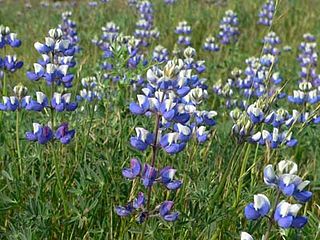
Lupinus nanus, the sky lupine, field lupine, dwarf lupin, ocean-blue lupine or Douglas' annual lupine, is a species of lupine native to the western United States. It is found natively in California, Nevada, and on Steens Mountain in eastern Oregon. It tends to grow on slopes and in open or disturbed areas below 1300 meters.
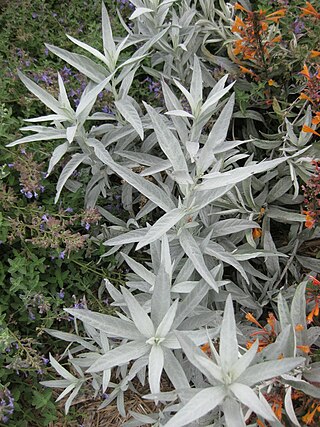
Artemisia ludoviciana is a North American species of flowering plant in the daisy family Asteraceae, known by several common names, including silver wormwood, western mugwort, Louisiana wormwood, white sagebrush, lobed cud-weed, prairie sage, and gray sagewort.

Solidago altissima, the tall goldenrod or late goldenrod, is a North American species of goldenrod in the family Asteraceae which is widespread across much of Canada, the United States, and northern Mexico. It is common in much of its range and fairly tolerant of landscapes which have been disturbed by humans. It has become naturalized in many parts of the world.

Solidago odora, the sweet goldenrod, anisescented goldenrod or fragrant goldenrod, is a North American species of goldenrod within the family Asteraceae. The plant is native to the United States and Mexico, found in every coastal state from Veracruz to New Hampshire and as far inland as Ohio, Missouri, and Oklahoma. It flowers from July through October.

Conoclinium coelestinum, commonly known as blue mistflower, mistflower, wild ageratum, or blue boneset, is a North American species of herbaceous perennial flowering plant in the family Asteraceae. It was formerly classified in the genus Eupatorium, but phylogenetic analyses in the late 20th century research indicated that that genus should be split, and the species was reclassified in Conoclinium.

Solidago velutina, the threenerve goldenrod or velvety goldenrod, is a plant species native to Mexico and to the western United States. The species has been found in southwestern Oregon, east to the Black Hills of South Dakota, and as far south as México State in the central part of the Republic of México. It is classified as a member of Subsection Nemorales.

Bigelowia nuttallii is a species of North American flowering plants in the family Asteraceae, native to the southern United States.
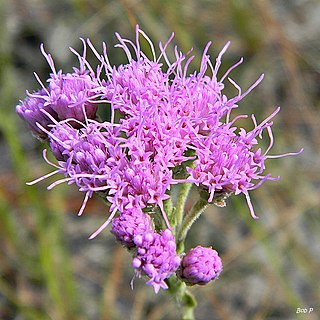
Carphephorus corymbosus, the Florida paintbrush or coastal plain chaffhead, is a species of North American plants in the family Asteraceae. They are native to the southeastern United States in the States of Florida, Georgia, and South Carolina.

Solidago rigida, known by the common names stiff goldenrod and stiff-leaved goldenrod, is a North American plant species in the family Asteraceae. It has a widespread distribution in Canada and the United States, where it is found primarily east of the Rocky Mountains. It is typically found in open, dry areas associated with calcareous or sandy soil. Habitats include prairies, savannas, and glades.

Solidago latissimifolia, common name Elliott's goldenrod, is North American species of flowering plants in the family Asteraceae. It is native to the Atlantic Coast of the United States and Canada, from Nova Scotia south to Alabama and Florida.
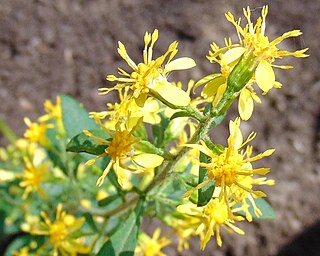
Solidago macrophylla, the largeleaf goldenrod or large-leaved goldenrod, is North American species of herbaceous perennial plants of the family Asteraceae. It is native to eastern and central Canada and the north-eastern United States. Some of the populations in Québec and Labrador lie north of the Arctic Circle.

Solidago nana is a North American plant species in the family Asteraceae, with the common names baby goldenrod and dwarf goldenrod. The species is native to deserts and mountainsides in the western United States, from the Rocky Mountains to the Great Basin in the states of Idaho, Montana, Nevada, Utah, Wyoming, Colorado, Arizona, and New Mexico.
Solidago pinetorum is a North American plant species in the family Asteraceae, called Small's goldenrod or pineywoods goldenrod. It is found in the east-central United States: Virginia, West Virginia, and the Carolinas.

Solidago radula, the western rough goldenrod, is a North American plant species in the family Asteraceae. It is found primarily in the southern Great Plains and the Mississippi Valley of the United States, with isolated populations farther east in Kentucky, Georgia, and the Carolinas.

Solidago uliginosa, or bog goldenrod, is a North American species of flowering plants in the family Asteraceae. It is found in eastern Canada and the eastern United States.
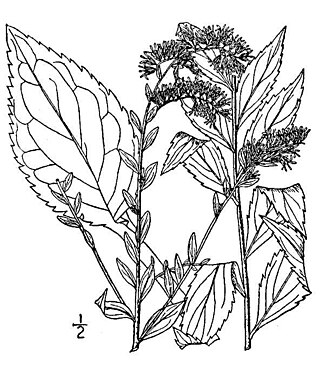
Solidago ulmifolia, commonly known as elmleaf goldenrod, is a North American species of goldenrod in the family Asteraceae. It is found in Canada and the eastern and central United States.

Aristolochia reticulata, the Red River snakeroot, Texas Dutchman's pipe, or Texas pipevine, is a species of perennial herb in the family Aristolochiaceae, and endemic to Arkansas, Louisiana, Oklahoma, and Texas. Its habit is erect to sprawling, up to 0.4 meters in height. It flowers in summer and late spring, and summer and grows in moist, sandy soils.

Solidago stricta, commonly known as wand goldenrod or willowleaf goldenrod, is a North American species of goldenrod in the family Asteraceae. A herbaceous perennial dicot it grows in the southern and southeastern United States. It has been described as having a wand like appearance and grows in sandy pine barren and wet coastal plain habitats. It blooms August to November.
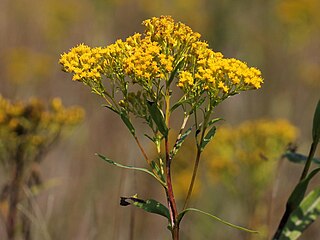
Solidago sect. Ptarmicoidei is a section of flowering plants in the genus Solidago. They are sometimes considered a separate genus: Oligoneuron. Like related species they are known as goldenrods. This section contains seven species of perennial herbs, all native to North America. They are distinguished from other goldenrods by their corymbiform flowerheads, which are flat or rounded in profile and about as broad as tall or broader, for which they are sometimes called flat-topped goldenrods.




















